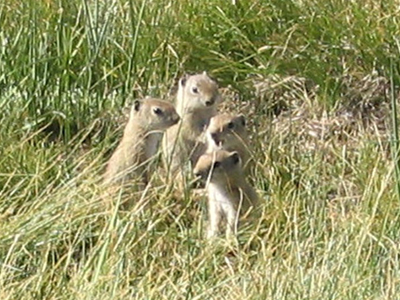New species of Cryptosporidium discovered
Chris Brunner, November 1, 2015

Belding’s ground squirrels discussing their newly named parasite
Drs. Xunde Li and Rob Atwill of the Western Institute for Food Safety and Security, along with colleagues from the School of Veterinary Medicine and the Division of Agriculture and Natural Resources (ANR-UC), discovered a new species of Cryptosporidium in various species of ground squirrel that they named Cryptosporidium rubeyi. This new species of protozoal parasite appears to colonize California, Belding’s, and Golden Mantled ground squirrels throughout California, resulting in high levels of fecal shedding of oocysts. C. rubeyi was not infectious for dairy calves nor laboratory mice, so this parasite exhibits some level of host specificity. At this time it is unknown if it is infectious for humans, but standard diagnostic tests can easily confuse this parasite with C. parvum which is highly infectious to humans. The original idea was to name this new parasite after a retired colleague, Ralph Phillips, an excellent livestock advisor who served the ranching community in Kern County for many years, but the thought of using his family name as a new species of parasite was not viewed favorably by Ralph. Therefore, C. rubeyi gets its name after Dr. Atwill’s deceased father whose childhood nickname was Rube.
The researcher’s paper, Cryptosporidium rubeyi n. sp. (Apicomplexa: Cryptosporidiidae) in multiple Spermophilus ground squirrel species is published in the International Journal for Parasitology: Parasites and Wildlife.
